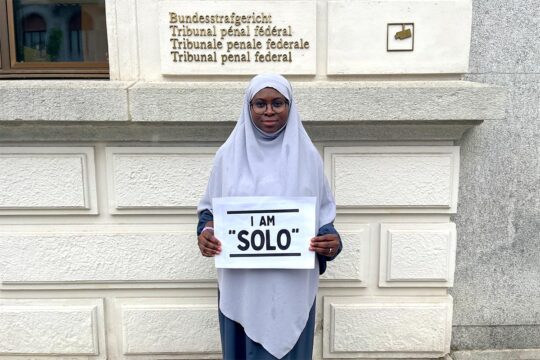As the rise of populist anti-establishment parties in western democracies – including in Switzerland – continues unabated, the events of 2016 have only served to push liberal democracies further into crisis.
After the waves of democracy that swept across the world following the fall of Latin American dictators in the 1980s and the implosion of the Soviet Union and the fall of the Berlin Wall in 1989, commentators and rankings alike now reveal a stagnation in the number of countries adopting democracy as a political system and a growth in the power of authoritarian regimes.
This year, as Britain has voted to leave the European Union, Donald Trump has won the Republican Party’s nomination for president of the United States and France has reeled from repeated terrorist attacks, anti-establishment parties from all sides of politics are striking at the very heart of the established democracies of the West. Are we seeing a protest vote in the face of the difficulties governments have had in managing the multiple crises which have defined the first two decades of this century?
Some argue the malaise goes deeper than a simple protest vote. An article in the most recent edition of the Journal of Democracy, published by the National Endowment for Democracy which is financed by the US Congress to promote liberal democracy around the world, questions whether citizens in the US and Europe remain committed to the concept of democracy.
Titled “The danger of deconsolidation, the democratic disconnect”, the piece draws on data from World Values Surveys taken between 1995 and 2014. Authors Roberto Stefan Foa and Yascha Mounk write:
“Not so long ago, young people were much more enthusiastic than older people about democratic values: In the first waves of the World Values Survey, in 1981–84 and 1990–93, young respondents were much keener than their elders on protecting freedom of speech and significantly less likely to embrace political radicalism. Today, the roles have reversed: On the whole, support for political radicalism in North America and Western Europe is higher among the young, and support for freedom of speech lower.”
Seduced by the military regime
In the past three decades, the share of US citizens who think it would be a “good” or “very good” thing for the “army to rule” – a patently undemocratic stance – has steadily risen. In 1995, just one in 16 respondents agreed with that position; today, one in six agrees.
While those who hold this view remain in the minority, they can no longer be dismissed as a small fringe, especially since there have been similar increases in the number of those who favour a “strong leader who doesn’t have to bother with parliament and elections” and those who want experts rather than the government to take decisions for the country.
In Europe, the generation gap is somewhat less stark but equally clear, with 53% of older Europeans and only 36% of millennials strongly rejecting the notion that a government’s incompetence can justify having the army take over.
“Rising support for illiberal politics is driven not only by the disempowered, middle-aged, and underemployed. Its vocal supporters can also be found among the young, wealthy, and privileged,” write Foa and Mounk.
In declaring themselves open to a military government, are not these young Americans in fact expressing their discontent with the current system? Marc Plattner, editor of the Journal of Democracy responds:
“This is a question I first asked myself when I saw the data. I found it hard to believe the number of people in the US who indicated that they might want a military government because in the US, in particular, there is no tradition whatsoever of military government,” he says.
“I’m still a little sceptical, but after the events of the past six months in American politics I’m not as sceptical as I was before. It does seem that there is a significant segment of voters, but far from a majority, who are extremely dissatisfied with the way that democracy is working, and might even be prepared to consider undemocratic, or at least illiberal, alternatives.”
Questionable research method
But Karima Bousbah, a PhD student on the Democracy Barometer research project at the Swiss National Science Foundation, is doubtful.
“There has been a change in relation to the attachment to the values upon which western democracies were founded,” she says. “That said, I believe the article follows a line that is too alarmist. Also, it compares the US with Europe but that general comparison does not apply to all the countries which make up Europe, given their diversity.”
Bousbah also points out that there is no Swiss data available that examine the attachment or not of young people to liberal democratic values.
David Sylvan, professor at Geneva’s Graduate Institute of International and Development Studies, also takes aim at the fundamentals of the article.
“It’s a respectable article from an academic point of view, but it poses several problems,” he says. “For example, the choice of data, the time periods considered, the comparisons it makes and so on. The thesis of the article may be true, but the data presented in no way allow us to draw such conclusions.”
Neo-conservative debate
Sylvan, an expert in international relations and political science, argues the Foa/Mounk analysis belongs more to the political and intellectual context of the US.
“This article is a contribution to a current debate between different neo-conservative factions,” Sylvan says.
Sylvan argues the debate was personified by Francis Fukuyama with the 1992 publication of “The end of history and the last man”, and by Samuel Huntington who published “The Clash of Civilisations” in 1993. These works presented an optimistic vision of the inevitable victory of western democracies as opposed to the thesis according to which the values of western liberal democracies are attacked by other systems of thought present around the world. It’s a debate which continues to rouse emotions, not only in the US, but also among other policy makers.
The results of this neo-conservative vision, which formed the basis of US foreign policy as enacted by George W Bush in the wake of the September 11 attacks on the World Trade Center cannot be ignored; the 2003 invasion of Iraq was a forerunner to the current conflicts sweeping across the Middle East.
But do these realities eradicate the credibility of the analysis put forward by the Journal of Democracy article, which Plattner insists is not the fruit of neo-conservatives? The rise of the populist parties in Europe is not a mirage. Neither is the polarising and anti-establishment campaign of Donald Trump in the US.
Resilient democracies?
René Schwok, director of Geneva’s Global Studies Institute, points out that despite their current troubles, there is little chance western democracies will succumb to a military or popular overthrow.
“What we don’t say enough is that the extremist parties of the left and the right seem to me to be really rallied to democracy and the rule of law. Marine Le Pen could eventually win the French elections. But if she were to lose the next time, she would join the opposition and would not make a coup d’état. Like in Poland, there could be some attacks against democracy and the state of law, but this country is still a democratic country,” Schwok says.
“So yes, the technological revolution underway is destabilising and driving resentment of foreigners, immigrants and the European Union. We must remain vigilant. But democracy doesn’t mean the absence of conflict, social or economic difficulties, frustrations, corruption or other things.”
This article was previously published by swissinfo.





